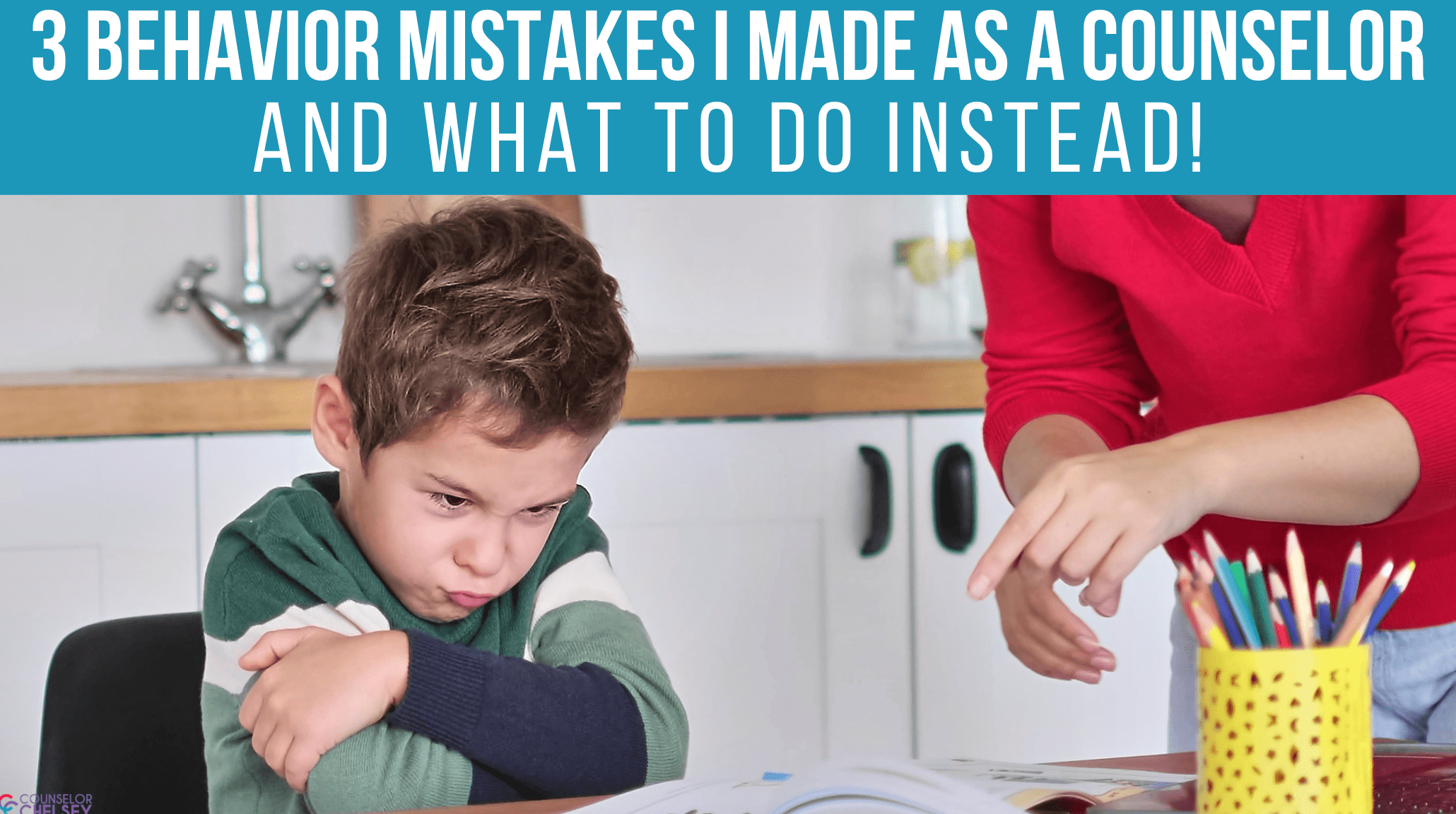3 Behavior Mistakes I Made As A Counselor & What To Do Instead
When I began my work as a counselor, I didn’t feel prepared. I knew all of the theories, but felt at a loss of what to actually do to support the students. The biggest struggle for me was behavior management and intervention. It was so hard because there isn’t a one-size-fits-all solution, and what helps a student one day might not work the next day.
I don’t have a magic wand that will “fix” all of the challenging behaviors in your school, but I have made plenty of mistakes that have taught me valuable lessons. My hope is that these behavior management tips will help you feel more confident and prepared when it comes to supporting student behavior.
Mistake #1: Taking The Behavior Personally
I remember it vividly. I was working with a 2nd grade student who was a frequent flyer. Honestly, he probably had the most challenging behavior in the whole school. I had been working with him since Kindergarten and we had come a long way. But, on this particular day, I was walking him back to his classroom and he was NOT happy about it. As we were walking through the hallway, he was screaming terrible things at me, and I was SO hurt and frustrated. He was my buddy! We had worked through SO much together! How could he treat me like this??
Plus, his behavior had me feeling like the worst counselor ever. I figured that since I was teaching behavior expectations and social skills, that I was a terrible counselor if students didn’t use the skills they learned from me. I felt like a total failure.
It’s of course normal (and okay!) to feel upset in situations like that, but I had to remind myself that his behavior was a reflection of what was going on in HIS life, and not a personal attack.
Try this instead: Constantly remind yourself that you can’t force students to do (or not do) anything, and that your success as an educator is not dependent on other students’ behaviors.
Some of my favorite affirmations are:
They aren’t giving me a hard time, they are having a hard time.
I’m not responsible for someone else’s behavior.
Mistake #2: Not Acknowledging My Own Feelings
Supporting students with challenging behavior can be freaking hard. And of course, we’re not robots, so it’s normal to feel frustrated and upset about it sometimes. But, there have been times when I haven’t been aware of my own feelings and have let them get a little out of control - resulting in saying and doing things that I didn’t mean and that were unfair. Not only did this further escalate the situation, but I missed out on great opportunities to model self-regulation.
Try this instead: Pay attention to how you are feeling when supporting students with challenging behavior! I’ve had to remind myself time and time again that even though I’m the adult in the situation, I’m still allowed to experience emotions. I sometimes have to tell myself the same thing that I tell students: “It’s okay to be mad, but it’s not okay to be mean.” Don’t be afraid to take a quick break from the situation if you can, grab a drink of water, or take deep breaths. Remember that those things are not a sign of weakness!
Mistake #3: Going At It Alone
These handouts are a great place to start when collaborating with teachers and families about behavior interventions.
Being a school counselor, psychologist or social worker can feel like you’re on your own little island, and it can sometimes be easy to stay there. So often, I have worked with students on positive behavior within my four office walls and expect them to take the skills out into the real world. I have felt like it was my job, and my job only, to teach the students the social and emotional skills they need.
Unfortunately, that mentality not only makes me feel totally responsible for the child’s actions, but also actually makes it harder for the child to use the skills and strategies we’ve talked about. If they are only practicing and hearing about these things once in a small group or isolated office, it’s going to be even more challenging to use them in the real world. Let’s face it: It’s much harder to use coping skills when someone is in your face making you mad than it is when you’re practicing with puppets.
While it is vitally important that we implement behavior interventions, it is going to be more challenging for them (and for us), if we don’t involve the other people in the child’s life.
Try this instead: Work with the other adults in the child’s life. This means collaborating with teachers and parents on the behavior interventions, and not being afraid to refer students and families to outside help when necessary! Supporting challenging behavior as a team will be more beneficial to us and to our students.
It seems like behavior management and intervention is like “trial by fire.” My hope is that these tips will help you learn from my mistakes and that supporting students with challenging behavior may be a little less challenging for you. For some tried and true behavior strategies, make sure you grab my free behavior intervention cheat sheet below!









